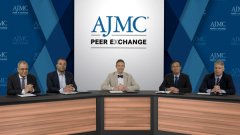
The Decision-Making Process Behind Elective Gastroscopy (EGD) in the Treatment of HCC.
The decision to perform an EGD is evaluated between academic and community health care perspectives.
Episodes in this series

In this segment of the video discussion, the medical experts delve into the challenges surrounding access to essential medical procedures for patients with hepatocellular carcinoma (HCC). Salem shares a personal anecdote highlighting the difficulties faced by patients in rural areas, where acquiring necessary biopsies or treatments can be a considerable challenge. He emphasizes the importance of being mindful of practice locations and resources when considering treatment options.
The conversation shifts toward the potential delays in initiating treatment, particularly in obtaining esophagogastroduodenoscopies (EGDs). There is a consensus among the experts that immediate access to endoscopy is not always readily available, especially in community settings, leading to significant delays that can impact patient outcomes. The experts emphasize the critical importance of timely intervention, considering that many patients present symptomatically rather than through routine screenings. They stress the need for considering the risks and benefits of treatment delays, especially when there is no urgent need for immediate intervention.
Salem highlights the disparities in access to medical facilities, with certain areas in North Carolina necessitating travel to major centers like Cairo or Alexandria for crucial procedures, which can pose additional financial burdens on patients. The experts underscore the complexities associated with patient evaluations in gastrointestinal cancer cases, which often involve multiple clearances and authorization processes. This complexity contributes to further delays in accessing necessary treatments.
Despite the challenges, the experts acknowledge the potential variations in decision-making processes between different medical centers, whether academic or community-based. Salem emphasizes the need to consider available resources and the practicality of applying certain treatments in real-world scenarios, stressing the importance of mindful decision-making in clinical practice.
Throughout the discussion, the experts stress the significance of balancing the urgency of treatment initiation with the potential risks associated with delayed procedures. They emphasize the broader issue of immediate access to endoscopy and the necessity for a comprehensive approach to address the various challenges faced by patients in different health care settings. This discussion serves to underscore the critical need for improved accessibility and streamlined processes in the treatment and management of HCC.
Video synopsis is AI-generated and reviewed by AJMC editorial staff.
Newsletter
Stay ahead of policy, cost, and value—subscribe to AJMC for expert insights at the intersection of clinical care and health economics.










